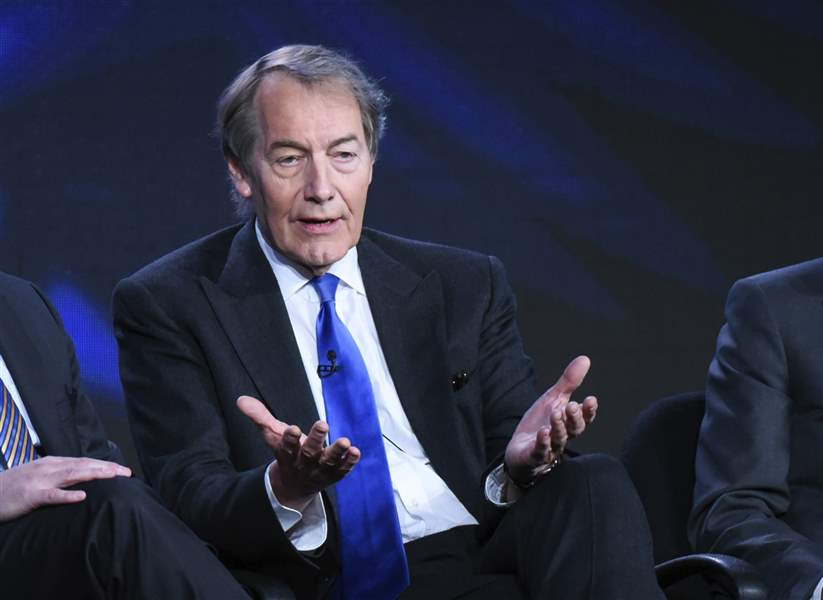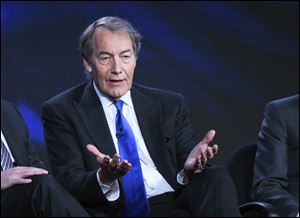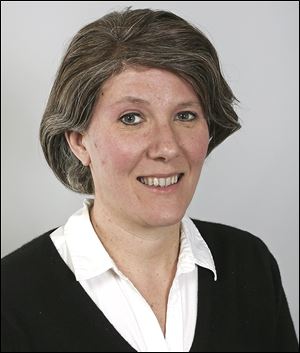
COMMENTARY
Charlie Rose's story one of compromise and complicity
12/3/2017

Several women have accused talk show host Charlie Rose of harassment and unwanted sexual advances.
ASSOCIATED PRESS
AT OUR family’s Thanksgiving dinner table, talk quickly turned to Charlie Rose.
“Can you believe,” my aunt asked, “that his producer told one of his accusers ‘That’s just Charlie being Charlie?’”
“I can’t believe he said that,” another aunt said.
“She,” I said.

Several women have accused talk show host Charlie Rose of harassment and unwanted sexual advances.
“What?”
“She. The producer who said that was a woman.”
That bit of information right there was enough to put everyone off their stuffing and pumpkin pie.
In the wake of Mr. Rose’s firing, Yvette Vega, his longtime producer at PBS, admitted saying that to the intern who complained to her about inappropriate advances. And for what it is worth, she apologized.
“I should have stood up for them. I failed. It is crushing. I deeply regret not helping them,” Ms. Vega said.
Being a woman with some power in an environment where very few women have any can be dicey.
Women account for only about one-third of the journalists in the world. And women hold an even smaller proportion of the industry’s elite and powerful jobs, such as producing Charlie Rose’s PBS show. Imagine the compromises Ms. Vega must have thought she had to make to keep a position of power.
Before she became the first woman editor of the New York Times, Jill Abrahamson worked as a deputy to Michael Oreskes. Years later, he would be outsted from his post as senior vice president of news and editorial director at National Public Radio when allegations of inappropriate behavior during his Times tenure surfaced.
Ms. Abramson admitted she had noticed him “pestering” and paying too much attention to a young, female colleague. She has said she regrets not intervening.
“If I had to do it again, I would have told him to knock it off,” she said.
I will never forget being asked by a male boss (years ago at another company) to mentor a younger woman in the newsroom who had complained about crude remarks he’d made in a meeting. He asked me and a couple other veteran female editors to coach her, help her understand how to thrive in a male-dominated industry.

Everett
I chose to take his request as an opportunity to let her know that she had allies. But I knew in my heart what he was really asking was for us to give him cover. To tell her that this kind of behavior was just something women have to put up with in newsrooms.
He believed that as a male manager who had promoted and advocated for women, that he had earned a pass on bad behavior. Did Charlie Rose have the same expectation?
Only a fraction of people who feel harassed at work — one-fourth, according to a 2016 study by the federal Equal Employment Opportunities Commission — ever report it. That is mainly because they fear retaliation or that superiors will not believe them, the report said.
Likewise, women seemingly have very rarely stood up for other women when they are victimized. It may be for similar reasons — no one is likely to believe them or to act on their complaints. And they are more likely to face retaliation themselves than solve the problem.
If Jill Abramson had told Michael Oreskes to “knock it off,” would she have ever become the first female editor? Would Yvette Vega have kept her job as Charlie Rose’s producer if she confronted him for his bad behavior?
There certainly must be many women with regrets like Ms. Abramson’s or Ms. Vega’s. Powerful men who abuse or harass vulnerable subordinates don’t just count on the silence of those victims, they count on the silence of others who they force into complicity.
If the women who were cornered by Charlie Rose or Michael Oreskes or the myriad other men revealed in recent months to be serial predators of the workplace can summon the courage to speak up, then the women who have been quietly complicit in all these horrible scenarios should be able to find their courage too.
It’s time to put the men in power on notice. We’re not allies in this, and we’re not covering for you anymore.
Wynne Everett is a member of The Blade’s editorial board.